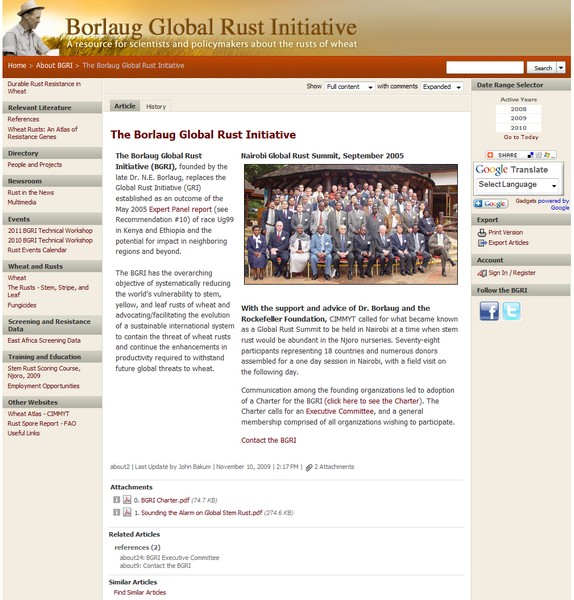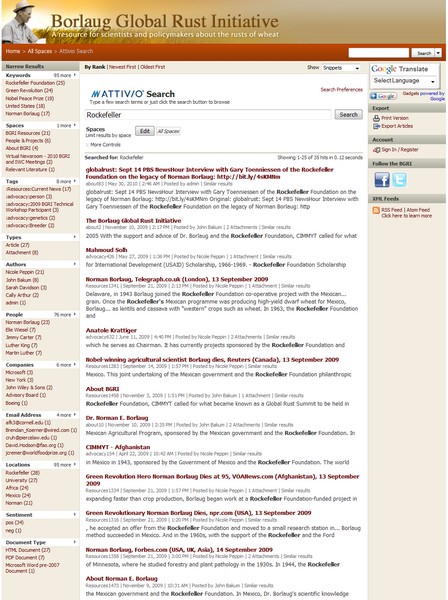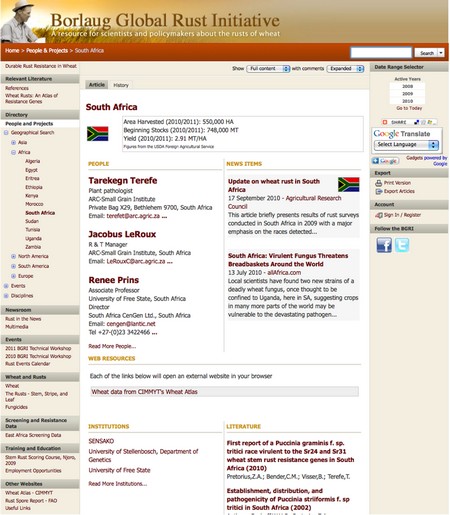Borlaug Global Rust Initiative
Combating the Wheat Rust Pandemic: Bridging the Worldwide Scientific Community with Enterprise 2.0 Social Software -- Wheat rust is a serious fungal disease affecting wheat caused by the rust fungus Puccinia triticina. It is the most prevalent of all the wheat rust diseases, occurring in nearly all areas where wheat is grown. Thought to be all but extinct for more than 50 years, the world is now facing a new pandemic of wheat rust -- Ug99, a highly virulent stem rust variant. This strain could potentially be responsible for the destruction of more than a third of worldwide wheat production. Such a failure could be devastating as wheat is the world's most widely planted crop and accounts for a fifth of humanity's calorie intake (1).
The Borlaug Global Rust Initiative (BGRI), a collaborative effort led by Cornell University and including such prestigious organizations as the University of Minnesota, University of California Davis, the University of Sydney, the USDA, the Kenya Agricultural Research Institute and more, with support from the Bill & Melinda Gates Foundation, was formed to reduce the world's vulnerability to wheat rust diseases through a first-ever international collaboration in wheat research.
The Challenge:
Currently, only a handful of organizations have expertise on the subject of wheat rust. The BGRI needed a way to bring these experts as well as a dispersed community of wheat scientists, universities and agricultural research organizations in more than 50 countries together to collaborate, educate a broader community and disseminate details on wheat rust research and best practices to prevent its spread.
Further, within the scientific community knowledge is typically spread through the publication of research within peer-reviewed scientific journals – a process that can slow the exchange of knowledge by months and years. However, the BGRI could not afford to operate on that kind of timeline. Ug99 isn't just on the march; it's mutating, and has developed the ability to overcome resistance genes that were being used to combat it. The project leaders needed a collaboration platform that could be easily organized, easily updated and accessible from anywhere in the world.
The Solution:
The BGRI decided to create a community portal where research could be published, shared and collaborated upon. Further, the site would offer resources and training for the scientists who have never witnessed wheat rust first hand.
The project organizers, led by Cornell University, selected Traction TeamPage from Traction Software, an award winning social software solution that combines wiki, blog, tagging, activity streams, discussion and social networking capabilities in a secure, scalable Enterprise 2.0 Social Software platform.
In a short period of time (a few weeks), the BGRI launched Global Rust (www.globalrust.org), a publicly available web-based knowledge source for wheat scientists, agricultural research organizations, policymakers and others. As part of the newly-launched community there is a public domain for information sharing as well as private communities where researchers can come together to collaborate in a more focused manner.
Today, the site coordinators and users alike have noted that the site is an excellent resource of news and critical research information on wheat rust. Through Traction TeamPage's access control features, leaders are able to more easily disseminate information that has been appropriately vetted and scientists can collaborate privately and securely on grant proposals to secure future funding, while Traction's version control feature enables teams to keep track of shared documents. Effectively, TeamPage satisfies their need for a virtual intranet; project management and collaboration tools; private communities; and a public wiki resource.
Additionally, the Traction TeamPage Attivio Search Module, which includes Attivio, Inc.'s Active Intelligence Engine (AIE), was selected to power search and information access, which are considered vital functions for the website. AIE is a unified information access platform that aggregates content in all forms – structured, unstructured and semi-structured. The Attivio Search Module and underlying AIE gives researchers and other wheat rust community stakeholders easy access to relevance ranked search, guided by advanced entity extraction as well as further drill down based on explicit facets including tags on the content, and implicit facets, such as derived key words and phrases, that occur prominently in the content.
Attivio's AIE enables Global Rust site visitors to wade through thousands of pages, documents, presentations and books. For example, the "bible" of wheat rust – the "Wheat Rust Atlas" published more than 20 years ago (and since out of print) offers more than 200 pages of key wheat rust information. Previously, getting copies of this book was difficult and expensive. The leaders of the Global Rust community struck a deal with the publishers and they were able to put a PDF of the entire book onto the TeamPage site. Through relevance ranking in the search results, excerpts from the book appear when the search terms appear near each other and in the proper order. This brings key source information to hurried researchers without requiring them to sift through 100s of pages.
Once blind to the full community of researchers, institutions, NGOs and other wheat research advocates, all stakeholders can now quickly navigate the wiki table of contents in the Advocacy space in Traction TeamPage. The Global Rust team used the wiki Table of Contents and parent/child features to build navigation into continent and country-based lists of people, projects and institutions focused on the rust problem. Exposing the community opens up new lines of communications, allows better sharing of best practices across country and continent borders and enables the community to better leverage scarce expertise.
Since the site's initial launch, content has increased multiple fold. With more content, there comes a driving need to constantly improve site navigation and information retrieval capabilities. The Global Rust team leverages TeamPage "sections" to dynamically display key content and easily reorganize the content. Meanwhile, with increasing content, the relevance engine in Attivio's AIE improves results and user efficiency via keyword facets and other advanced features.
Results:
Today, the site is used for knowledge-sharing as well as cultivating a rust community to combat Ug99. The combination of Traction TeamPage and Attivio's Active Intelligence Engine has enabled the Global Rust site to be user-friendly and to deliver key content to more than 300 researchers daily. In addition to the aggregation of data and content, at any given time, there are more than 25 people on the site working collaboratively to combat the rust threat.
Because of the immediacy in which research and data are available, the community has been able to get information to the public in a more timely fashion, including news about the availability of Ug99-resistant wheat varieties. Further, the collaborations have resulted in studies and reports that have enabled additional funding opportunities for more research projects and sustainable defenses against the wheat rust fungus.
Because of the initial success achieved through the globalrust.org community, the BGRI continues to grow its membership and encourage scientists and policymakers to publish important details on wheat rust. As part of this, site coordinators are introducing multi-media functions such as video and streaming media to further the collaboration effort and to better train those in the field who are working to identify and combat wheat rust first hand.
(1) "Rust in the bread basket," The Economist, July 3, 2010
See also
19 Nov 2010 | Borlaug Global Rust Initiative Wins 2010 Forrester Groundswell Social Impact Award
Press961: 29 Oct 2011 | KMWorld - Rich options expand the collaborative horizon
26 Feb 2010 | Great Wired Magazine story on Borlaug Global Rust Initiative



 I18N ERROR: @tsiskin#footer_RSS_Feed
I18N ERROR: @tsiskin#footer_RSS_Feed